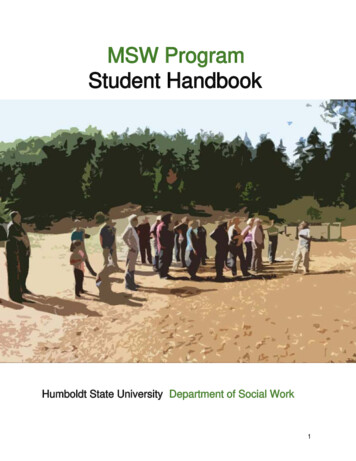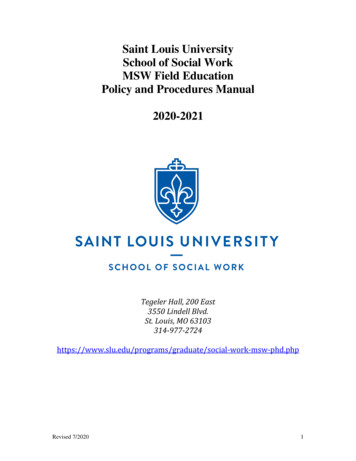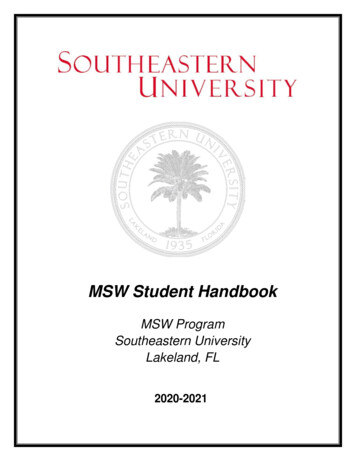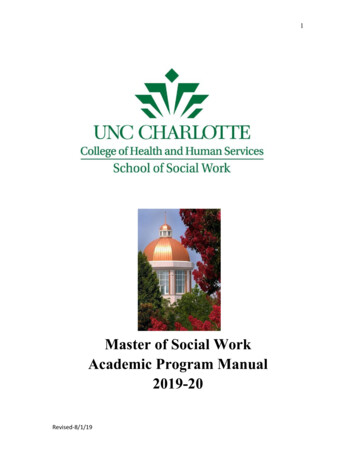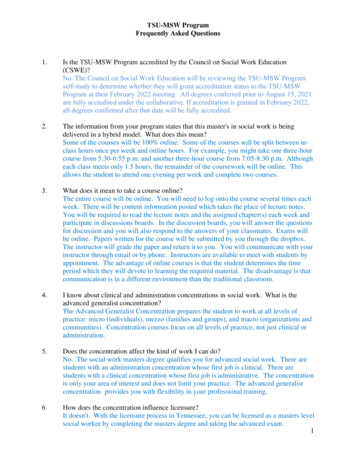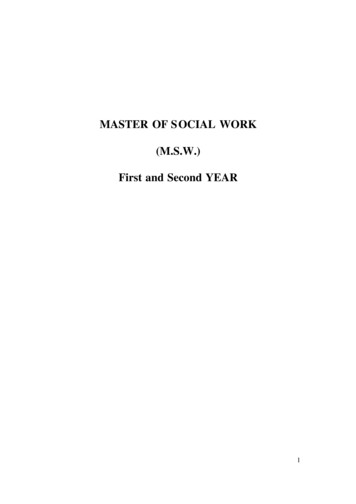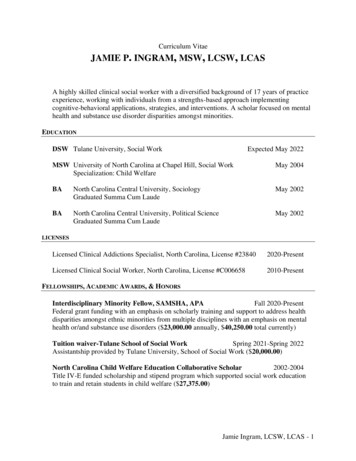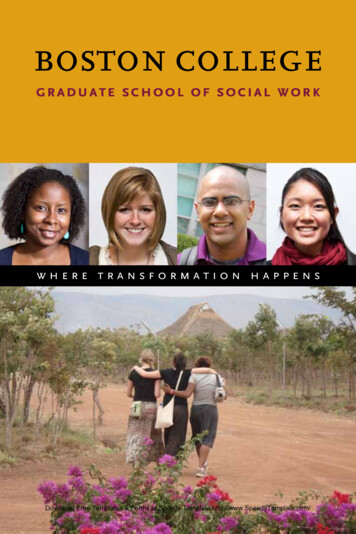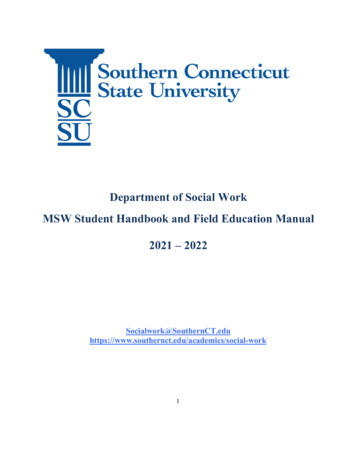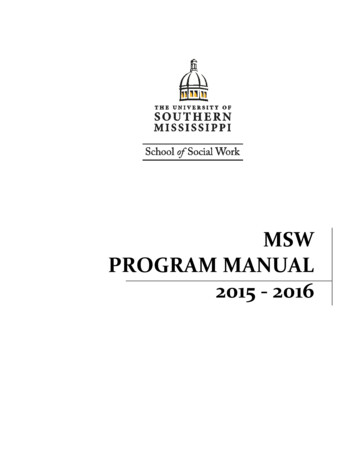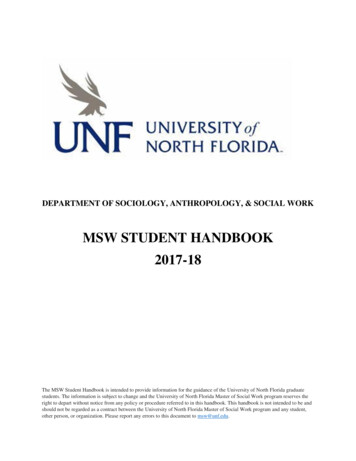
Transcription
DEPARTMENT OF SOCIOLOGY, ANTHROPOLOGY, & SOCIAL WORKMSW STUDENT HANDBOOK2017-18The MSW Student Handbook is intended to provide information for the guidance of the University of North Florida graduatestudents. The information is subject to change and the University of North Florida Master of Social Work program reserves theright to depart without notice from any policy or procedure referred to in this handbook. This handbook is not intended to be andshould not be regarded as a contract between the University of North Florida Master of Social Work program and any student,other person, or organization. Please report any errors to this document to msw@unf.edu.
THE UNIVERSITY OF NORTH FLORIDADEPARTMENT OF SOCIOLOGY, ANTHROLOGY, & SOCIAL WORKMSW Student Handbook 2017-2018Welcome to the University of North Florida (UNF) Master of Social Work (MSW) Program!The information contained in this handbook is the student’s guide to the UNF MSW Program. Itis intended to help you successfully navigate your MSW Program of Study. You will finddetailed descriptions of academic and professional performance requirements as well as a varietyof student resources available to you on the UNF campus. MSW students are required to adhereto the policies and procedures described in this handbook.The Handbook contains information available on: MSW Program requirementsAdvising requirementsResources and services for studentsAcademic policies and proceduresStudents are responsible for knowing Program, Departmental, College and University policiesand procedures as published in the UNF MSW Handbook, the MSW Field Education Manualand Graduate School Handbook. If you have questions or concerns regarding the MSWProgram’s policies and procedures, please do not hesitate to contact Dr. Baffour, the MSWProgram Director at tiffany.baffour@unf.edu or the Chair of the Department of Sociology,Anthropology, and Social Work, Dr. Robert Thunen at rthunen@unf.edu. Students can also findimportant information available on the Departmental Website at:http://www.unf.edu/coas/sasw/Master of Social Work Program.aspx .Note Regarding Academic PoliciesWe make every effort to ensure that the policies contained in the UNF MSW Student Handbookare up to date and in accordance with University policies. In the event that the policies containedin this Handbook conflict with official University policies, the University’s policy will supersedethis document. Students should also be aware that some policies, such as graduationrequirements, are linked to the student’s catalog year (typically the year a student was admittedto the University or to the major). Thus, two students in the same program may be subject todifferent requirements. For this reason, we encourage you to meet regularly with your FacultyAdvisor to ensure that you are aware of and on track to meet all graduation requirements.2
Table of ContentsAdministrative Officers, Program Location & Contact Information6University of North Florida 2017-18 Academic Calendar7I.MSW PROGRAM OVERVIEW9University and Department Overview & Mission9Program Mission and Goals10Program Competencies10MSW Program Faculty14Equal Opportunity & Diversity Statement20Sexual Harassment Policy20Sexual Misconduct Policy20II.MSW ADMISSIONS POLICIES21Admissions Criteria & Procedures21Admissions Process23New Student Orientation23III.MSW CURRICULUM24Traditional MSW Program of Study24Advanced Standing Program of Study26Advanced Generalist Practice Concentration28Capstone Project28Directed Independent Study29Elective Courses293
Field Education Overview30IV. ACADEMIC POLICIES31Academic Standards31Transfer Student Policy31Life Experience & Work Experience Credit Policy31Academic Integrity Code31Academic & Personal Conduct32Termination32Academic Advising33Graduation Requirements33Incomplete Grades34Appeals & Grievances34Program Communication35Computers, Internet Access, and Electronic Devices35Class Attendance and Participation35Adding and Withdrawing from Classes35Inactive Students36Americans with Disabilities Act / Military & Veteran Students36V.STUDENT RESOURCES37Counseling Center37College of Arts and Sciences Career Success Center37Disability Resource Center37InterFaith Center384
International Center38Lesbian, Gay, Bisexual and Transgender (LGBT) Resource Center38Military & Veterans Resource Center38Police Department39Student Health Services39Student Ombudsman39Victim Advocacy39Women’s Center40Writing Center40VI. STUDENT ORGANIZATIONS41Graduate Student Organization41National Association of Social Workers (NASW)41Student Government41VII. APPENDIXAcademic and Personal Code of Conduct425
MSW ADMININSTRATIVE OFFICERS AND PROGRAM LOCATIONDEPARTMENT OF SOCIOLOGY, ANTHROPOLOGY & SOCIAL WORKADMININSTRATIVE OFFICERSDr. Robert Thunen, Department Chair, Sociology, Anthropology, & Social WorkDr. Tiffany Baffour, MSW Program DirectorProfessor Akanke Omorayo-Adenrele, MSW Field Education DirectorMrs. Dana McCoy, Program Assistant, Social WorkPROGRAM LOCATION & CONTACT INFORMATIONUniversity of North FloridaDepartment of Sociology, Anthropology, and Social Work1 UNF DriveJacksonville, FL 32224-2645MSW@unf.edu(904) 620-28676
Fall 2017 – Spring 2018 CalendarFall 2017Event DateTitle8/15/2017MSW StudentOrientationUNF Building 51Rm. 21218/21/2017Fall 2017 ClassesBeginPracticum BeginsUNFLabor Day(Department ClosuresLast Day to Petitionto Add a Class forFall 2017Deadline toWithdraw from ALLFall 2017 Classes for25% RefundFall 2017 Mid-TermGrades AvailableVeterans DayObserved (UniversityClosed)Fall 2017 WithdrawalDeadline (NoRefund)ThanksgivingHoliday (UniversityClosed)No practicumUNFStudents can make-uppracticum hours12/1/2017Fall 2017 ClassesEndUNFStudents must endpracticum/notallowed to make uphours after this date.12/2-12/8/2017Final Exam WeekUNFCheck with yourinstructor and coursesyllabus for dates8/22/20179/4/2017 (All day)9/8/2017 8:00am9/15/201710/12/2017 (All day)11/10/2017 (All day)11/17/2017 (All day)11/23 – 25/ 2017EventAt agencyUNFmyWings/One-StopStudent ServicesNotesMandatory for ALLstudentScheduled practicumdaysStudents can make-uppracticum hoursCheck with youracademic advisorCheck with youracademic advisormyWingsUNFStudents can make-uppracticum hoursMyWings7
Spring 2018Event DateTitleEventNotes1/2018 (All day)University Closed forHoliday BreakUNF1/8/2018 (All day)Spring 2018Add/Drop and LateRegistration ( 100Fee)Spring 2018 ClassesBeginEnd of Spring 2018Add/Drop and LateRegistration ( 100Fee)Martin Luther KingJr. Holiday(University Closed)Midterm Grades Postto myWingsSpring Break 2018UNFMyWings/One-StopStudent ServicesAt agencyOn the days ofscheduled practicumCheck with youracademic advisorSpring 2018 ClassesEndSpring 2018 TermEnds)UNFFinal Exam WeekUNF1/8/2018 (All day)1/12/2018 (All day)1/15/2018 (All day)3/1/2018 (All day)3/19 – 24/20184/20/2018 (All day)4/27/2018 (All day)4/21-4/26MyWings/One-StopStudent ServicesUNFmyWingsUNFUNF8Check with agency toensure they areclosedCheck with youracademic advisorStudents can make-uppracticum hoursStudents can make-uppracticum hoursStudents must endpracticum/notallowed to make uphours after this dateFinal Exam Week
THE MASTER OF SOCIAL WORK (MSW) PROGRAMUniversity and Department Overview and MissionThe University of North Florida is a public university located in Jacksonville, Florida whichenrolls approximately 16,000 students annually. A member institution of the State UniversitySystem of Florida, UNF is accredited by the Southern Association of Colleges and SchoolsCommission on Colleges to award baccalaureate, masters and doctorate degrees. The 1,381-acrecampus in Northeast Florida is considered a driver in the region, with an annual economic impactof nearly 1 billion. Each year, 4,000 students graduate from the university's five colleges: theBrooks College of Health, the Coggin College of Business, the College of Arts and Sciences, theCollege of Computing, Engineering and Construction and the College of Education and HumanServices. The Princeton Review has named UNF one of the best colleges in the Southeast forseven consecutive years, and Forbes Magazine has also named UNF one of “America's BestColleges.” UNF received the prestigious Carnegie Classification for Community Engagement.While the national recognition is an important benchmark of the University’s quality and value,it is the small class sizes and individualized attention that have become hallmarks of a UNFeducation.The mission at The University of North Florida is to foster the intellectual and cultural growthand civic awareness of its students, preparing them to make significant contributions to theircommunities in the region and beyond. At UNF, students and faculty engage together andindividually in the discovery and application of knowledge. UNF faculty and staff maintain anunreserved commitment to student success within a diverse, supportive campus culture.The UNF MSW Program is housed within the Department of Sociology, Anthropology, and SocialWork. The Department’s overarching goals are to provide “greater understanding of humanbehavior with a focus on its social and cultural contexts, both locally and globally; practical andapplied skills in which our students and faculty draw upon their knowledge to critically analyzeand enhance the diverse communities in which they live and work; and a stimulating and diverseenvironment for students to learn.” The mission of the MSW program is highly consistent withthese departmental goals. The Department launched a BSW Program that was fully accredited bythe Council on Social Work Education (CSWE) in 2015. The Department also offers a SocialWelfare concentration for undergraduate Sociology majors and a Social Welfare minor forstudents majoring in other disciplines.9
Program MissionThe mission of The Master of Social Work (MSW) Program at The University of North Florida(UNF) is to prepare students for leadership roles in clinical practice, community practice,administration and policy-making positions with diverse client systems in the North Floridaregion, the state, and beyond. Further, the program seeks to enhance students’ understanding ofand sensitivity to economic and social inequalities. Graduates of UNF’s Master of Social Work(MSW) program will demonstrate specialized practice knowledge and skills to successfully serveindividuals, families, groups, communities, and organizations. Advanced generalist practiceintegrates greater theoretical and methodological knowledge, as well as research and evaluationsophistication at micro, mezzo and macro levels. Advanced generalist practitioners competentlyengage in independent and culturally responsive application of advanced social work knowledge,theories, skills, values, and ethics into assessment and intervention. The program seeks to preparestudents to serve the state’s most vulnerable populations in areas such as mental health, substanceabuse, hospice and palliative care, crisis intervention, child welfare, disaster relief, and criminaljustice. These settings demand that students synthesize and apply inter- and multi-disciplinaryknowledge and skills in an ethical and competent manner to address needs in complex, multisystem service environments. The program prepares graduates for engagement in practiceinformed research and research-informed social work practice through its emphasis oncommunity-informed and community-based research.GoalsIn accordance with our mission, the MSW program aims to:In accordance with our mission, the MSW program aims to prepare advanced generalistpractitioners who:1. Are self-reflective and competent to engage in autonomous and ethical social work practicewith multiple systems and diverse populations;2. Continually strive to increase cultural appropriateness including understanding of andsensitivity to economic and social inequalities;3. Demonstrate a commitment to serve and advocate for those who are vulnerable, marginalized,and oppressed;4. Engage in research-informed practice and practice-informed research;5. Demonstrate the ability to evaluate their own practice and programs based upon criticalanalysis and assessment.Program CompetenciesAs required by the CSWE’s (2015) Educational Policy & Accreditation Standards, all UNFMSW students will demonstrate the following nine core competencies at an advanced level:1) Demonstrate Ethical and Professional Behavior. Social workers understand the value base ofthe profession and its ethical standards, as well as relevant laws and regulations that may impactpractice at the micro, mezzo, and macro levels. Social workers understand frameworks of ethicaldecision-making and how to apply principles of critical thinking to those frameworks in practice,10
research, and policy arenas. Social workers recognize personal values and the distinctionbetween personal and professional values. They also understand how their personal experiencesand affective reactions influence their professional judgment and behavior. Social workersunderstand the profession’s history, its mission, and the roles and responsibilities of theprofession. Social Workers also understand the role of other professions when engaged in interprofessional teams. Social workers recognize the importance of life-long learning and arecommitted to continually updating their skills to ensure they are relevant and effective. Socialworkers also understand emerging forms of technology and the ethical use of technology insocial work practice.2) Engage Diversity and Difference in Practice. Social workers understand how diversity anddifference characterize and shape the human experience and are critical to the formation ofidentity. The dimensions of diversity are understood as the intersectionality of multiple factorsincluding but not limited to age, class, color, culture, disability and ability, ethnicity, gender,gender identity and expression, immigration status, marital status, political ideology, race,religion/spirituality, sex, sexual orientation, and tribal sovereign status. Social workersunderstand that, as a consequence of difference, a person’s life experiences may includeoppression, poverty, marginalization, and alienation as well as privilege, power, and acclaim.Social workers also understand the forms and mechanisms of oppression and discrimination andrecognize the extent to which a culture’s structures and values, including social, economic,political, and cultural exclusions, may oppress, marginalize, alienate, or create privilege andpower3) Advance Human Rights and Social, Economic, and Environmental Justice. Social workersunderstand that every person regardless of position in society has fundamental human rights suchas freedom, safety, privacy, an adequate standard of living, health care, and education. Socialworkers understand the global interconnections of oppression and human rights violations, andare knowledgeable about theories of human need and social justice and strategies to promotesocial and economic justice and human rights. Social workers understand strategies designed toeliminate oppressive structural barriers to ensure that social goods, rights, and responsibilities aredistributed equitably and that civil, political, environmental, economic, social, and culturalhuman rights are protected.4) Engage in Practice-informed Research and Research-informed Practice. Social workersunderstand quantitative and qualitative research methods and their respective roles in advancinga science of social work and in evaluating their practice. Social workers know the principles oflogic, scientific inquiry, and culturally informed and ethical approaches to building knowledge.Social workers understand that evidence that informs practice derives from multi- disciplinarysources and multiple ways of knowing. They also understand the processes for translatingresearch findings into effective practice.5) Engage in Policy Practice. Social workers understand that human rights and social justice, aswell as social welfare and services, are mediated by policy and its implementation at the federal,state, and local levels. Social workers understand the history and current structures of socialpolicies and services, the role of policy in service delivery, and the role of practice in policy11
development. Social workers understand their role in policy development and implementationwithin their practice settings at the micro, mezzo, and macro levels and they actively engage inpolicy practice to effect change within those settings. Social workers recognize and understandthe historical, social, cultural, economic, organizational, environmental, and global influencesthat affect social policy. They are also knowledgeable about policy formulation, analysis,implementation, and evaluation.6) Engage with Individuals, Families, Groups, Organizations, and Communities. Social workersunderstand that engagement is an ongoing component of the dynamic and interactive process ofsocial work practice with, and on behalf of, diverse individuals, families, groups, organizations,and communities. Social workers value the importance of human relationships. Social workersunderstand theories of human behavior and the social environment, and critically evaluate andapply this knowledge to facilitate engagement with clients and constituencies, includingindividuals, families, groups, organizations, and communities. Social workers understandstrategies to engage diverse clients and constituencies to advance practice effectiveness.7) Assess Individuals, Families, Groups, Organizations, and Communities. Social workersunderstand that assessment is an ongoing component of the dynamic and interactive process ofsocial work practice with, and on behalf of, diverse individuals, families, groups, organizations,and communities. Social workers understand theories of human behavior and the socialenvironment, and critically evaluate and apply this knowledge in the assessment of diverseclients and constituencies, including individuals, families, groups, organizations, andcommunities. Social workers understand methods of assessment with diverse clients andconstituencies to advance practice effectiveness. Social workers recognize the implications of thelarger practice context in the assessment process and value the importance of inter-professionalcollaboration in this process. Social workers understand how their personal experiences andaffective reactions may affect their assessment and decision-making.8) Intervene with Individuals, Families, Groups, Organizations, and Communities. Socialworkers understand that intervention is an ongoing component of the dynamic and interactiveprocess of social work practice with, and on behalf of, diverse individuals, families, groups,organizations, and communities. Social workers are knowledgeable about evidence-informedinterventions to achieve the goals of clients and constituencies, including individuals, families,groups, organizations, and communities. Social workers understand theories of human behaviorand the social environment, and critically evaluate and apply this knowledge to effectivelyintervene with clients and constituencies. Social workers understand methods of identifying,analyzing and implementing evidence-informed interventions to achieve client and constituencygoals. Social workers value the importance of inter-professional teamwork and communicationin interventions, recognizing that beneficial outcomes may require interdisciplinary, interprofessional, and inter- organizational collaboration.9) Evaluate Practice with Individuals, Families, Groups, Organizations, and Communities.Social workers understand that evaluation is an ongoing component of the dynamic andinteractive process of social work practice with, and on behalf of, diverse individuals, families,groups, organizations and communities. Social workers recognize the importance of evaluating12
processes and outcomes to advance practice, policy, and service delivery effectiveness. Socialworkers understand theories of human behavior and the social environment, and criticallyevaluate and apply this knowledge in evaluating outcomes. Social workers understand qualitativeand quantitative methods for evaluating outcomes and practice effectiveness.13
MASTER OF SOCIAL WORK PROGRAM FACULTYTiffany D. Baffour, PhD, MSS, MAAssociate Professor of Social Work & MSW Program DirectorBuilding 4, Room 2312(904) 620-5457tiffany.baffour@unf.eduDr. Tiffany D. Baffour is the MSW Program Director and an Associate Professor of SocialWork. She received her Ph.D. from Howard University, Master of Social Service from BrynMawr College, and M.A. in Sociology from the University of Delaware. Dr. Baffour has morethan 15 years of experience as a social work educator having taught at Florida State University,University of Missouri-Columbia, Howard University, University of Maryland, James MadisonUniversity, and Winston-Salem State University.A researcher of health, social, and racial justice issues, Dr. Baffour led recent efforts as a seniorresearcher and co-principal investigator of a statewide evaluation of disproportionate minoritycontact in the North Carolina juvenile justice system. Dr. Baffour has published and offeredjuried presentations on the application of Community-Based Participatory Research (CBPR) as ameans for improving health and social disparities in low wealth communities. Her researchinterests include CBPR, violence prevention, restorative justice theory, mental health and(physical) health advocacy, and health care delivery systems. She has diverse practiceexperiences as program developer, therapist, and social worker with juvenile offenders, childrenin foster and kinship care, and teens and adults with mental health and substance abusevulnerabilities.Dr. Baffour held a wide array of administrative roles in higher education prior to her tenure atUNF, including department chairperson and director of university-wide faculty development,community-engaged teaching and distance learning programming efforts. In 2016, Dr. Baffourprovided leadership for a system-wide effort for the University of North Carolina system asProject Director of the i3@UNC, an innovative inter-disciplinary faculty development initiativeto train a cadre of educators regarding teaching and learning and the integration of technology inhybrid and online classes. She is a member of the Council on Social Work Education (CSWE),American Public Health Association, and The National Association of Social Workers. Dr.Baffour was appointed to CSWE’s Council on Conferences and Professional Development from2017-20, a decision-making body that sets policy related to conferences and faculty developmentprograms at the sole accrediting agency for social work education in the United States and itsterritories.14
Shinwoo Choi, PhD, MSSWAssistant Professor of Social WorkBuilding 4, Room 2310(904) 620-5424choi@unf.eduDr. Choi received a Ph.D. in social work from University of Illinois at Urbana-Champaign. Sheearned the MSSW from Columbia University with a concentration of policy practice. Dr. Choihas a Bachelor of Arts in Psychology from McGill University in Canada.Dr. Choi’s research and teaching interests include diversity, inclusion, and cultural competencyin social work. She is interested in the effects of perceived racial discrimination –including racialmicroaggressions– on racial minority immigrants’ psychological well-being and their copingstrategies. Dr. Choi aims to further investigate the role of racial/ethnic identity as a coping factorand also explore the gendered racial microaggressions among racial minority male and femalestudents. She is also interested in mezzo-level social work practice in order to decrease theincidence of racial discrimination and promote diversity in given settings such as schools,university campus, and/or work places.In addition to her research and teaching experiences, Dr. Choi has various practice experiences,such as a coordinator of a Group Cognitive Behavioral Therapy (GCBT) for depressedimmigrant mothers and a clinical research coordinator of health disparities projects.Currently Dr. Choi is an Assistant Professor of Social Work. She joined the faculty at theUniversity of North Florida in August 2017.15
Paul G. Clark, PhD, MSWAssistant Professor of Social Work & BSW Program DirectorBuilding 4, Room 2310(904) 620-5296p.clark@unf.eduDr. Clark received a Ph.D. in social work from Virginia Commonwealth University (VCU). Heearned the MSW from Norfolk State University with a dual concentration in social work practicein mental health and macro practice settings. Prior to earning the MSW, Dr. Clark received aBachelor of Arts degree in sociology from Christopher Newport College.Dr. Clark’s teaching and research interests are in the areas of social work practice in health andmental health settings, behavioral oncology, development of evidence-based practice incommunity oncology settings, and the role of social work in cancer survivorship. He isparticularly interested in the efficacy and effectiveness of social work interventions fordecreasing cancer-related distress and improvement of quality of life.In addition to his experience as an educator and researcher, Dr. Clark has engaged in the practiceof social work in health and mental health settings for more than 25 years as both a clinician andadministrator.Dr. Clark is an Assistant Professor of Social Work. He joined the faculty at the University ofNorth Florida in August 2014.16
Ross McDonough, MSW, LCSW, CAPInstructor & BSW Field Education DirectorBuilding 4, 2310(904) 620-1653ross.mcdonough@unf.eduProfessor McDonough earned his MSW from New York University in the Clinical Social WorkProgram. He holds a license credential (Licensed Clinical Social Worker) in the State of Floridato practice psychotherapy and Clinical Social Work. He also holds a certification credential(Certified Addiction Professional) to provide substance abuse treatment and evaluations in theState of Florida.Professor McDonough has over ten years of Clinical Social Work practice experience. He hasworked with many populations (i.e., children, teens, adults, couples, families and groups) inseveral different practice settings, including hospitals, non-profit organizations, residentialtreatment facilities, outpatient clinics and in private practice. One of his clinical interests isholistic family intervention with Oppositional Defiant Disorder. He also specializes in familyconflict and loyalty binds in divorced families.Currently Professor McDonough is an Instructor and the Field Education Director for the BSWprogram. He has been a full-time Instructor at UNF since 2011 and lectured as an AdjunctInstructor for the two years prior.17
Akanke Omorayo-Adenrele, MSWInstructor & MSW Field Education DirectorBuilding 4, Room 2310(904) 620-5368omorayo-adenrele@unf.eduProfessor Akanke Omorayo-Adenrele earned her MSW from Hunter College, New York and herBSW from Fairleigh Dickinson University, New Jersey. Currently, Professor OmorayoAdenrele is an Instructor and the Field Education Director for the MSW program. She joined thefaculty at the University of North Florida in fall 2017.Professor Omorayo-Adenrele brings substantial experience in micro, mezzo, and macro socialwork, both in private and public settings. She brings over a decade of social work fieldeducation experience. Previously, she worked in various capacities in the Indiana UniversitySchool of Social Work (IUSSW), including the field coordinator in their MSW Online program.During her tenure at IUSSW, she also acted as one of the Faculty Supervisors for the OutreachClinic and as a Faculty Field Liaison/Lecturer.While at the University of Michigan, she worked as a Program Specialist in the Center for theEducation of Women: “Women of Color in the Academy Project,” developing programs andactivities to support the recruitment, retention, and professional development of female facultyand graduate students of color.She has also provided counseling services, crisis intervention, program planning, and advocacywork through several organizations in New York City, Ann Arbor, Michigan, and Trinidad andTobago. Professor Omorayo-Adenrele’s interests include socio-acculturation of women andchild immigrants and global discourse in social work.18
Jennifer Spaulding-Givens, PhD, MSWAssistant Professor of Social WorkBuilding 4, Room 2311(904) 620-1640j.spaulding-givens@unf.eduDr. Spaulding-Givens earned a Ph.D. in Social Work from Florida State University, where shealso received a Master of Social Work degree with a concentration in Social Policy andAdministration. Prior to joining the UNF Faculty in 2006, Dr. Spaulding-Givens served as theOperations Coordinator of Florida Self-Directed Care, a public mental health program forindigent adults diagnosed with a severe and persistent mental illness.Dr. Spaulding-Givens’ primary research agenda is devoted to identifying more strengths-based,participant-directed policy and practice strategies for mental health service delivery. She alsoengages in research on social work education. Her teaching interests range from the history andanalysis of social welfare policy to social work practice, administration, and programevaluation. She routinely teaches Social Work Communication, Social Welfare Policy, andInside the Asylum: A Critical History of American Psychiatry.Dr. Spaulding-Givens is an Assistant Professor of Social Work. From 2011 to 2017, she servedas the inaugural BSW Program Director, coordinating the development, implementation, andnational accreditation of the UNF BSW Program.19
UNF EQUAL OPPORTUNITY AND DIVERSITY STATEMENTThe University of North Florida is committed to providing an inclusive and welcomingenvironment for all who interact in our community and strives to attract students, faculty andstaff from a variety of cultures, backgrounds and life experiences. W
Admissions Criteria & Procedures 21 Admissions Process 23 New Student Orientation 23 III. MSW CURRICULUM 24 Traditional MSW Program of Study 24 . The mission of The Master of Social Work (MSW) Program at The University of North Florida (UNF) is to prepare students for leadership roles in clinical practice, community practice, .
